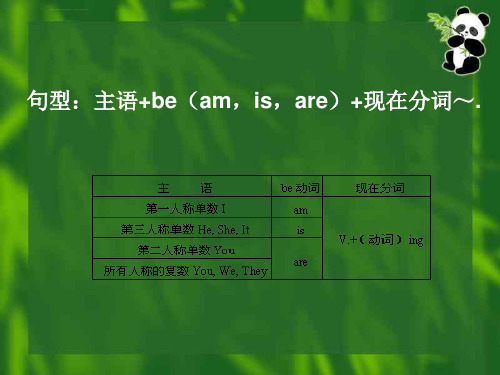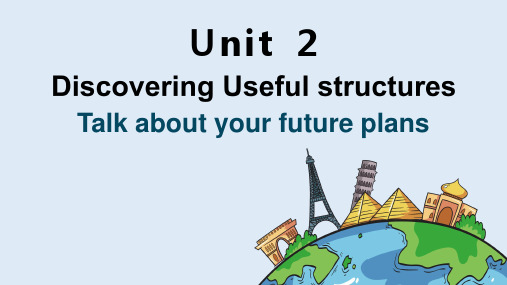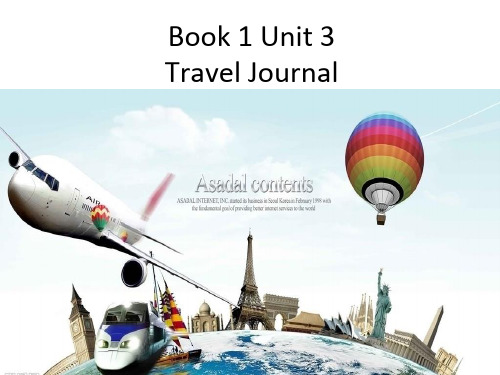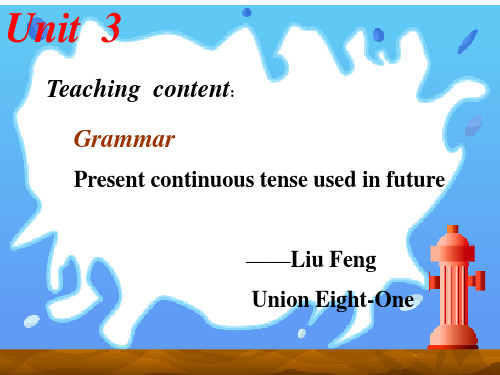现在进行时表将来(微课课件)
合集下载
语法-进行时表将来ppt课件.ppt

1.The building___C____ , I can't stand its noise.
A. builds
B. is built
C. is being built D. was being built
2. I can't catch up with the fashion, because
1,说话时正在进行的动作 或所处状态
*The telephone is ringing, would you answer it, please? *What are you doing? * I’m writing a letter. 常与now ,right now, at present , at the moment , these days等时间状语连用
3,现在时表将来。a.表示即将发生的或预定中 病原体侵入机体,消弱机体防御机能,破坏机体内环境的相对稳定性,且在一定部位生长繁殖,引起不同程度的病理生理过程 计划好的活动。现在进行时表示将来时,即表示 按计划或安排在最近将要进行的动作。 这种用法比较生动,给人一种期待感。 它常表示最近或较近的将来,
* I want to know when he ___B____ for New York tomorrow. A. has left B. is leaving C. had left D. has been leaving
• He___B____ of how he can do more for the people.
is no easy task because technology ____A___ so rapidly.
A. is changing B. has changed C. will have changed D. will change 3 Rainforests ____C___ and burned at such a
A. builds
B. is built
C. is being built D. was being built
2. I can't catch up with the fashion, because
1,说话时正在进行的动作 或所处状态
*The telephone is ringing, would you answer it, please? *What are you doing? * I’m writing a letter. 常与now ,right now, at present , at the moment , these days等时间状语连用
3,现在时表将来。a.表示即将发生的或预定中 病原体侵入机体,消弱机体防御机能,破坏机体内环境的相对稳定性,且在一定部位生长繁殖,引起不同程度的病理生理过程 计划好的活动。现在进行时表示将来时,即表示 按计划或安排在最近将要进行的动作。 这种用法比较生动,给人一种期待感。 它常表示最近或较近的将来,
* I want to know when he ___B____ for New York tomorrow. A. has left B. is leaving C. had left D. has been leaving
• He___B____ of how he can do more for the people.
is no easy task because technology ____A___ so rapidly.
A. is changing B. has changed C. will have changed D. will change 3 Rainforests ____C___ and burned at such a
现在进行时表将来通用课件

特点
使用现在进行时表达未来的动作 或状态,强调该动作或状态即将 发生。
与其他时态的区别
与一般现在时的区别
一般现在时表示现在发生的动作或状 态,不涉及未来。
与一般将来时的区别
一般将来时明确表示未来的动作或状 态,与现在时间没有直接联系。
使用的情境与场合
计划安排
表达即将发生的动作
当计划在未来某个时间点进行某个动 作或事件时,可以使用现在进行时表 将来。
示例 They are getting married next month.(他们下个月结 婚。)
表示预测或推断的动作
01
总结词
这个时态用于描述基于当前情况或常识的预测或推断,通常表示一种可
能性或趋势。
02 03
详细描述
现在进行时可以表示基于当前情况或常识的预测或推断,通常表示一种 可能性或趋势,如“The weather is getting warmer, so spring is coming”(天气越来越暖和,所以春天来了)。
在学术活动的日程安排或会议议程中,现在进行时可以用来表示未来的计划或活动,例如 “会议正在安排在周三上午9点开始”。
在商务沟通中的应用
商务计划和报告
在制定商业计划或撰写商业报告 时,可以使用现在进行时来描述 未来的目标、计划或预期成果, 例如“公司正在制定下一财年的 销售目标”。
会议和谈判
在进行商务会议或谈判时,现在 进行时可以用来表达即将讨论的 议题或即将达成的协议,例如“ 我们正在讨论合作的具体细节”。
在日常交流中的应用
日常闲聊
在非正式的日常闲聊中,人们常常使用现在进行时来表达即将发 生的事情,例如“我们正在去公园”表示即将去公园。
安排和计划
使用现在进行时表达未来的动作 或状态,强调该动作或状态即将 发生。
与其他时态的区别
与一般现在时的区别
一般现在时表示现在发生的动作或状 态,不涉及未来。
与一般将来时的区别
一般将来时明确表示未来的动作或状 态,与现在时间没有直接联系。
使用的情境与场合
计划安排
表达即将发生的动作
当计划在未来某个时间点进行某个动 作或事件时,可以使用现在进行时表 将来。
示例 They are getting married next month.(他们下个月结 婚。)
表示预测或推断的动作
01
总结词
这个时态用于描述基于当前情况或常识的预测或推断,通常表示一种可
能性或趋势。
02 03
详细描述
现在进行时可以表示基于当前情况或常识的预测或推断,通常表示一种 可能性或趋势,如“The weather is getting warmer, so spring is coming”(天气越来越暖和,所以春天来了)。
在学术活动的日程安排或会议议程中,现在进行时可以用来表示未来的计划或活动,例如 “会议正在安排在周三上午9点开始”。
在商务沟通中的应用
商务计划和报告
在制定商业计划或撰写商业报告 时,可以使用现在进行时来描述 未来的目标、计划或预期成果, 例如“公司正在制定下一财年的 销售目标”。
会议和谈判
在进行商务会议或谈判时,现在 进行时可以用来表达即将讨论的 议题或即将达成的协议,例如“ 我们正在讨论合作的具体细节”。
在日常交流中的应用
日常闲聊
在非正式的日常闲聊中,人们常常使用现在进行时来表达即将发 生的事情,例如“我们正在去公园”表示即将去公园。
安排和计划
高二英语课件必修现在进行时表将来

添加 标题
描述未来可能性或假设:如“If the weather stays fine, we might go for a picnic this weekend.”
添加 标题
在 新 闻 标 题 中 使 用 : 如 “ Bre x i t Ta l k s to Resume Next Week”
添加标题
添加标题
添加标题
添加标题
现在进行时表将来通常用于表示 计划、安排、打算等,而将来进 行时通常用于表示预测、推测等。
现在进行时表将来表示的是一次 性的动作或状态,而将来进行时 表示的是持续性的动作或状态。
现在进行时表将来在哪些情况下不适用?
当句子中有明确的时间状语时,如“明天”、“下周”等,通常不使用现在进行时表将来。
结构和特点
现在进行时表将来的基本结构:主语+be+doing+future 特点:表示将来计划或安排的动作或状态 例子:I am going to the cinema tonight. 与一般将来时的区别:现在进行时表将来更强调计划性和确定性
添加标题 添加标题 添加标题 添加标题 添加标题 添加标题
现在进行时表将 来可以表示将来 发生的动作或状 态,而一般现在 时不能表示将来 发生的动作或状 态。
现在进行时表将来与将来进行时的区别是什么?
现在进行时表将来表示的是将来 某一时刻正在进行的动作或状态, 而将来进行时表示的是将来某一 时刻将要进行的动作或状态。
现在进行时表将来的结构是 “will be + 动词ing”,而将来 进行时的结构是“will + 动词原 形”。
现在进行时表将来的实际应用
在旅游英语中的应用
询问行程:"Are you going to visit the Great Wall tomorrow?"
高二英语课件必修现在进行时表将来

Function
Used for planning and arranging, predicting upcoming actions, expressing a temporary decision or intention, etc.
Example of usage scenarios
Planning and scheduling: For example, "I'm meeting my friend at the cinema tonight."
Differences and connections with the general future tense
Difference
Connection
The present continuous tense emphasizes an action or state that is currently taking place at a certain time in the future, while the general future tense emphasizes that an action or state will occur at a certain time in the future.
Simplification strategies for complex sentence structures
Using verb phrases
Merge sentences
Using verb phrases instead of clauses can simplify sentence structure and enhance expressive power. For example, "I am planning to travel to Europe next summer." can be simplified to "I am planning a trip to Europe next summer."
Used for planning and arranging, predicting upcoming actions, expressing a temporary decision or intention, etc.
Example of usage scenarios
Planning and scheduling: For example, "I'm meeting my friend at the cinema tonight."
Differences and connections with the general future tense
Difference
Connection
The present continuous tense emphasizes an action or state that is currently taking place at a certain time in the future, while the general future tense emphasizes that an action or state will occur at a certain time in the future.
Simplification strategies for complex sentence structures
Using verb phrases
Merge sentences
Using verb phrases instead of clauses can simplify sentence structure and enhance expressive power. For example, "I am planning to travel to Europe next summer." can be simplified to "I am planning a trip to Europe next summer."
初中英语语法一般现在时与现在进行时表将来课件市公开课一等奖省赛课微课金奖PPT课件

A: What time Chaty is arriving tomorrow? B: Half past ten. I am meeting her at the station.
I am not working tomorrow. So, we can go out somewhere!
Ian isn’t playing football next Saturday. He’s hurt his leg.
I am tired. I am going to bed! Goodnight! Tina, are you ready yet? – Yes, I am coming!
初中英语语法普通现在时与现在进行时表未来课件
第 4/146页
We use Present Continuous
- For personal commitments that have previously planned, for which preparations have already been made. (for example, buying tickets, reserving seats, making appointments, etc.)
What time does the film begin this evening?
Tomorrow is Sunday.
初中英语语法普通现在时与现在进行时表未来课件
第 7/176页
• We use Present Simple
- to talk about people if their plans are fixed like a timetable (actions that are part of a timetable, for example a holiday)
现在进行时表将来课件

1. We are waiting for you now.
此时此刻正在进行的动作
2. I'm doing my homework now.
3. She is learning to swim recently. 表示现阶段在做的动作 4. We are working on a farm these days.
3. Read the sentences and tick those that express future tense. Rewrite them in the present continuous tense.
__✓__ I 've just booked my air ticket! I'll visit my grandparents
My best friend is to be married in November this year. You are to be back by 9. Your plan is to be a failure. Fish __is__to______die without water.
5. be about to do 表将来
(1) 位移动词的进行时表示将来时 现在进行时表示将来,主要表示按计划或安排要发生的事。此时所 使用的动词多是表示位置移动的动词(词组), 如: come ,go off, leave , arrive, fly, start, travel, walk, ride, drive , take off 等。
5. I am leaving for Beijing next week. 表示即将发生的动作 6. I'm coming to Shanghai next Sunday.
此时此刻正在进行的动作
2. I'm doing my homework now.
3. She is learning to swim recently. 表示现阶段在做的动作 4. We are working on a farm these days.
3. Read the sentences and tick those that express future tense. Rewrite them in the present continuous tense.
__✓__ I 've just booked my air ticket! I'll visit my grandparents
My best friend is to be married in November this year. You are to be back by 9. Your plan is to be a failure. Fish __is__to______die without water.
5. be about to do 表将来
(1) 位移动词的进行时表示将来时 现在进行时表示将来,主要表示按计划或安排要发生的事。此时所 使用的动词多是表示位置移动的动词(词组), 如: come ,go off, leave , arrive, fly, start, travel, walk, ride, drive , take off 等。
5. I am leaving for Beijing next week. 表示即将发生的动作 6. I'm coming to Shanghai next Sunday.
现在进行时表将来PPT课件

---I’m going to the cinema with some friends. The film _______ (finish) quite early, so we _______ (go) to the bookstore after that.
6) I’ll give her th56
1) I ____a_m__w__o_r_k_i_n_g____ (work) very hard at the moment.
现在进行时表此刻正在做……
2) I’ve won a holiday for two weeks to Floridaam. It_a_k_i_n_g_________ (take) my mum.
Book 1 Unit 3 Travel Journal
Grammar
The Present Continuous Tense Expressing Futurity
现在进行时 表 将来
Underline The Present Continuous Tense Expressing Futurity
④ 现在进行时表将来有时含有“决心”的 意思,多用在_否__定______结构。
e.g. I’m not going. I’m not waiting for him any longer
Summary
What have we reviewed today?
• 在时间,条件状语从句中用__一_般__现__在__时__ __表__将__来_______ • 临时,突然决定用__w__il_l _d_o___ • 按照时刻表将要发生的事情用_一__般__现_在__时__
1) I’m leaving tomorrow. 2) I’m going to live with my uncle.
6) I’ll give her th56
1) I ____a_m__w__o_r_k_i_n_g____ (work) very hard at the moment.
现在进行时表此刻正在做……
2) I’ve won a holiday for two weeks to Floridaam. It_a_k_i_n_g_________ (take) my mum.
Book 1 Unit 3 Travel Journal
Grammar
The Present Continuous Tense Expressing Futurity
现在进行时 表 将来
Underline The Present Continuous Tense Expressing Futurity
④ 现在进行时表将来有时含有“决心”的 意思,多用在_否__定______结构。
e.g. I’m not going. I’m not waiting for him any longer
Summary
What have we reviewed today?
• 在时间,条件状语从句中用__一_般__现__在__时__ __表__将__来_______ • 临时,突然决定用__w__il_l _d_o___ • 按照时刻表将要发生的事情用_一__般__现_在__时__
1) I’m leaving tomorrow. 2) I’m going to live with my uncle.
现在进行时表将来(微课课件)

e.g. I’m leaving at seven tonight.
Task3: consolidation
Filling in the blanks by using the Present Continuous Tense 1. ---Why have you slept so early?
Affection and attitude:
Foster among students proper attitude needed for language learning—willingness to imitate,think and cooperate.
Language focus:
the difficult and important points:
3. When are we leaving and when are we coming back?
Do these sentences all represent the present continuous? What is the difference among them?
Task 2: Observation and sum up
with me for the weekend 6. Ladies and gentlemen, please fasten your
seat belts. The plane is taking off. leaving going coming moving taking off
Sum up
When the action verbs and verbs of tropism such as go, come, leave, get, arrive, meet, see off, take off, return, start, fly, stay, etc. are used in the Present Continuous Tense, they often represent the future, and there is often an indication of time. The action is usually regarded as having been decided upon beforehand.
Task3: consolidation
Filling in the blanks by using the Present Continuous Tense 1. ---Why have you slept so early?
Affection and attitude:
Foster among students proper attitude needed for language learning—willingness to imitate,think and cooperate.
Language focus:
the difficult and important points:
3. When are we leaving and when are we coming back?
Do these sentences all represent the present continuous? What is the difference among them?
Task 2: Observation and sum up
with me for the weekend 6. Ladies and gentlemen, please fasten your
seat belts. The plane is taking off. leaving going coming moving taking off
Sum up
When the action verbs and verbs of tropism such as go, come, leave, get, arrive, meet, see off, take off, return, start, fly, stay, etc. are used in the Present Continuous Tense, they often represent the future, and there is often an indication of time. The action is usually regarded as having been decided upon beforehand.
- 1、下载文档前请自行甄别文档内容的完整性,平台不提供额外的编辑、内容补充、找答案等附加服务。
- 2、"仅部分预览"的文档,不可在线预览部分如存在完整性等问题,可反馈申请退款(可完整预览的文档不适用该条件!)。
- 3、如文档侵犯您的权益,请联系客服反馈,我们会尽快为您处理(人工客服工作时间:9:00-18:30)。
----_________________at 5:00 am. (meet) 2.--Why have you brought such an overcoat?
--______________________. (come) 3.---Hurry! ___________________. (leave) 4.---How long ________in Shanghai ? (stay) ----For two weeks. I’m going to visit some schools.
e.g. I’m leaving at seven tonight.
Task3: consolidation
Filling in the blanks by using the Present Continuous Tense 1. ---Why have you slept so early?
Affection and attitude:
Foster among students proper attitude needed for language learning—willingness to imitate,think and cooperate.
Language focus:
the difficult and important points:
Reference words: when, where, how; leave, arrive, go, come, etc.
1. He is leaving for London next week. 2. “Where are we going?” I asked my sister. 3. “When are we coming back?” I kept asking her. 4. We are moving to the moon tomorrow . 5. Some friends of mine are coming to stay
3. When are we leaving and when are we coming back?
Do these sentences all represent the present continuous? What is the difference among them?
Task 2: Observation and sum up
Unit 3
Teaching content: Grammar
Present continuous tense used in future
——Liu Feng Union E: Knowledge and skills:
Facilitate the students to master the present continuous tense for future use and enable the students to use it correctly and freely.
The use of the present continuous tense for future use.
Task1: Skim the passage again and underline the present continuous tense.
1. Where are we going? 2. She is planning our schedule.
Abilities and strategies:
Guide the students to sum up rules systematically and find ways to help grasp the rules and encourage the students to imitate the use of language.
with me for the weekend 6. Ladies and gentlemen, please fasten your
seat belts. The plane is taking off. leaving going coming moving taking off
Sum up
When the action verbs and verbs of tropism such as go, come, leave, get, arrive, meet, see off, take off, return, start, fly, stay, etc. are used in the Present Continuous Tense, they often represent the future, and there is often an indication of time. The action is usually regarded as having been decided upon beforehand.
Make a short dialogue
Suppose you are Wangkun and your partner is Wangwei. You are making your travel plan to Kunming. Now please make a short dialogue. Attention, you must use the Present Continuous Tense to indicate future.
--______________________. (come) 3.---Hurry! ___________________. (leave) 4.---How long ________in Shanghai ? (stay) ----For two weeks. I’m going to visit some schools.
e.g. I’m leaving at seven tonight.
Task3: consolidation
Filling in the blanks by using the Present Continuous Tense 1. ---Why have you slept so early?
Affection and attitude:
Foster among students proper attitude needed for language learning—willingness to imitate,think and cooperate.
Language focus:
the difficult and important points:
Reference words: when, where, how; leave, arrive, go, come, etc.
1. He is leaving for London next week. 2. “Where are we going?” I asked my sister. 3. “When are we coming back?” I kept asking her. 4. We are moving to the moon tomorrow . 5. Some friends of mine are coming to stay
3. When are we leaving and when are we coming back?
Do these sentences all represent the present continuous? What is the difference among them?
Task 2: Observation and sum up
Unit 3
Teaching content: Grammar
Present continuous tense used in future
——Liu Feng Union E: Knowledge and skills:
Facilitate the students to master the present continuous tense for future use and enable the students to use it correctly and freely.
The use of the present continuous tense for future use.
Task1: Skim the passage again and underline the present continuous tense.
1. Where are we going? 2. She is planning our schedule.
Abilities and strategies:
Guide the students to sum up rules systematically and find ways to help grasp the rules and encourage the students to imitate the use of language.
with me for the weekend 6. Ladies and gentlemen, please fasten your
seat belts. The plane is taking off. leaving going coming moving taking off
Sum up
When the action verbs and verbs of tropism such as go, come, leave, get, arrive, meet, see off, take off, return, start, fly, stay, etc. are used in the Present Continuous Tense, they often represent the future, and there is often an indication of time. The action is usually regarded as having been decided upon beforehand.
Make a short dialogue
Suppose you are Wangkun and your partner is Wangwei. You are making your travel plan to Kunming. Now please make a short dialogue. Attention, you must use the Present Continuous Tense to indicate future.
